A triumph for science — and immigration
How an international All-Star team gave us the solution to the pandemic
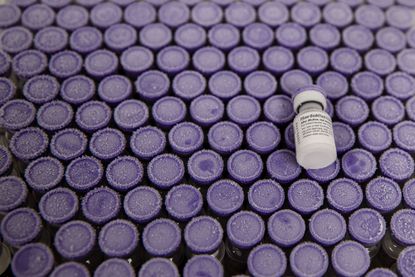

This is the editor's letter in the The Week magazine.
A month before the first American died of the coronavirus, scientists already had designed the vaccine. In a Massachusetts lab last Jan. 13, Moderna researchers used the genetic sequence of the virus, made public by China, to design an mRNA molecule that teaches the immune system to recognize and neutralize it. By February, their vaccine had actually been made and shipped to the National Institutes of Health to start clinical trials. This largely unknown time line shows that while development of coronavirus vaccines was astonishingly rapid, approval of them was painstaking: More than 300,000 Americans died and 16 million were infected while a nearly miraculous solution underwent testing and approval. "For the entire span of the pandemic in this country," David Wallace-Wells said last week in New York magazine, "we had the tools to prevent it." But for sound reasons of safety and ethics, science and government did not authorize their use — until now.
In this darkest winter in recent history, the vaccines promise a spring. They are a triumph of the Enlightenment values of science, reason, and evidence — all now under assault in a new Dark Ages in which demagogues and conspiracy theorists spread disinformation and distrust. Despite various attempts to claim credit, the vaccines would not exist without international cooperation. Moderna's vaccine employs technology created by Hungarian-born scientist Katalin Kariko, and the company is run by a team of researchers and entrepreneurs from around the world. The Pfizer vaccine was created by second-generation Turkish immigrants to Germany, Ugur Sahin and Ozlem Tureci, and has been pushed past the finish line by company CEO Albert Bourla, an immigrant from Greece. The pandemic of 2020 will not be the last crisis endangering humanity. What we've relearned in this traumatic year is that all we hold dear is fragile, and that science, community, and empathy light the road forward.
Subscribe to The Week
Escape your echo chamber. Get the facts behind the news, plus analysis from multiple perspectives.

Sign up for The Week's Free Newsletters
From our morning news briefing to a weekly Good News Newsletter, get the best of The Week delivered directly to your inbox.
From our morning news briefing to a weekly Good News Newsletter, get the best of The Week delivered directly to your inbox.
Create an account with the same email registered to your subscription to unlock access.
Sign up for Today's Best Articles in your inbox
A free daily email with the biggest news stories of the day – and the best features from TheWeek.com
William Falk is editor-in-chief of The Week, and has held that role since the magazine's first issue in 2001. He has previously been a reporter, columnist, and editor at the Gannett Westchester Newspapers and at Newsday, where he was part of two reporting teams that won Pulitzer Prizes.
-
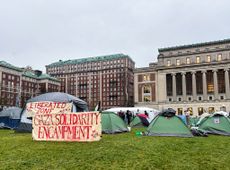 'Republicans want to silence Israel's opponents'
'Republicans want to silence Israel's opponents'Instant Opinion Opinion, comment and editorials of the day
By Harold Maass, The Week US Published
-
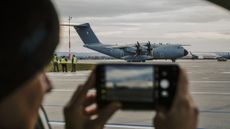 Poland, Germany nab alleged anti-Ukraine spies
Poland, Germany nab alleged anti-Ukraine spiesSpeed Read A man was arrested over a supposed Russian plot to kill Ukrainian President Zelenskyy
By Peter Weber, The Week US Published
-
 Today's political cartoons - April 19, 2024
Today's political cartoons - April 19, 2024Cartoons Friday's cartoons - priority delivery, USPS on fire, and more
By The Week US Published
-
 Israel hits Iran with retaliatory airstrike
Israel hits Iran with retaliatory airstrikeSpeed Read The attack comes after Iran's drone and missile barrage last weekend
By Peter Weber, The Week US Published
-
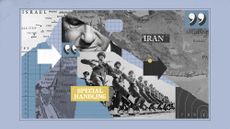 Is there a peaceful way forward for Israel and Iran?
Is there a peaceful way forward for Israel and Iran?Today's Big Question Tehran has initially sought to downplay the latest Israeli missile strike on its territory
By Sorcha Bradley, The Week UK Published
-
 Sudan on brink of collapse after a year of war
Sudan on brink of collapse after a year of warSpeed Read 18 million people face famine as the country continues its bloody downward spiral
By Peter Weber, The Week US Published
-
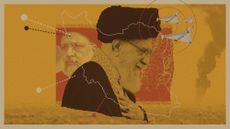 How powerful is Iran?
How powerful is Iran?Today's big question Islamic republic is facing domestic dissent and 'economic peril' but has a vast military, dangerous allies and a nuclear threat
By Harriet Marsden, The Week UK Published
-
 US, Israel brace for Iran retaliatory strikes
US, Israel brace for Iran retaliatory strikesSpeed Read An Iranian attack on Israel is believed to be imminent
By Peter Weber, The Week US Published
-
 How green onions could swing South Korea's election
How green onions could swing South Korea's electionThe Explainer Country's president has fallen foul of the oldest trick in the campaign book, not knowing the price of groceries
By Sorcha Bradley, The Week UK Published
-
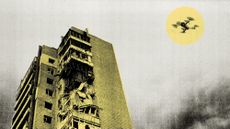 Ukraine's battle to save Kharkiv from Putin's drones
Ukraine's battle to save Kharkiv from Putin's dronesThe Explainer Country's second-largest city has been under almost daily attacks since February amid claims Russia wants to make it uninhabitable
By Sorcha Bradley, The Week UK Published
-
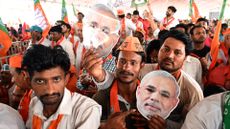 India elections 2024: the logistics of world's biggest vote
India elections 2024: the logistics of world's biggest voteThe Explainer More than 10% of the world's population is registered for a historic democratic exercise, with PM Modi likely to dominate again
By Harriet Marsden, The Week UK Published